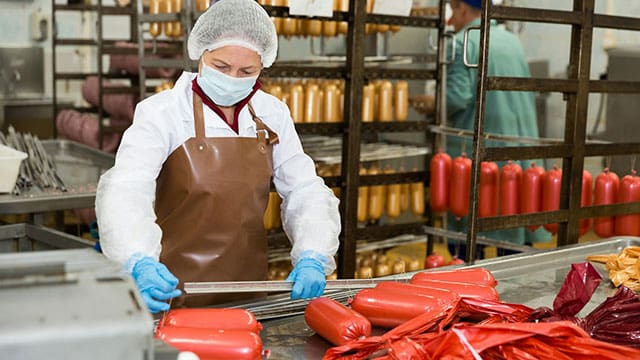Canada’s own trade barriers and lack of innovation are doing more damage to agri-food than Trump ever could

For interview requests, click here
The Trump administration’s recent decision to impose a 25 per cent tariff on Canadian and Mexican food products is a wake-up call for Canada’s agri-food sector. However, the temporary delay in implementing the tariffs gives Canada a brief window to address its own policy shortcomings.
As a nation that prides itself on food security and a robust agricultural trade surplus, Canada now faces a critical test of its ability to remain competitive in an increasingly protectionist global economy.
According to the new Global Agri-Food Most Influential Nations Ranking, compiled by the Agri-Food Analytics Lab at Dalhousie University and commissioned by MNP, a major Canadian accounting, tax, and business consulting firm, Canada ranks 13th among G20 nations in terms of global agri-food influence.
The United States, our neighbour, is No. 1. While Canada performs well in food security and political stability, its weaknesses lie in innovation, trade diversification, regulatory efficiency and interprovincial trade barriers. These vulnerabilities are now being exposed as Canada navigates an uncertain trade landscape.
 Stop blaming Trump. Our own policies are killing Canada’s agri-food sector. |
| Recommended |
| Fentanyl and border security are a smokescreen; Trump’s trade war is about power
|
| Wake up Ottawa! Free trade is dead
|
| Canada’s interprovincial trade barriers make Trump’s 51st state jab hit home
|
Canada’s agri-food trade surplus stands at $13.3 billion, ranking fifth among G20 nations. This surplus underscores Canada’s role as a net food exporter, supplying high-quality agricultural products to global markets, with the U.S. being the most significant trading partner.
If implemented, a 25 per cent tariff on Canadian food exports would inevitably disrupt this balance, making Canadian goods less competitive in the U.S. market, leading to lower profit margins for producers and ultimately affecting Canadian consumers.
The tariffs would also exacerbate existing industry challenges. Our report highlights Canada’s struggle with high logistical costs due to its vast geography, regulatory obstacles for small businesses and lack of strategic investments in value-added processing.
Compounding these issues are interprovincial trade barriers which prevent the efficient movement of food products within Canada itself. These barriers, ranging from differing provincial regulations to taxation inconsistencies, increase costs for producers and limit economic growth.
With the uncertainty surrounding U.S. tariffs, the need for Canada to build stronger trade alliances beyond the U.S. has never been more urgent.
Canada is classified as a Tier 2 country in global agri-food competitiveness, trailing behind Tier 1 leaders like the U.S., Japan, China and Germany. These nations have implemented policies that encourage innovation, facilitate exports and support domestic industries through targeted investments.
Canada’s fragmented regulatory framework, interprovincial trade restrictions and inconsistent support for agri-food innovation leave it vulnerable in times of economic turbulence.
Our report highlights the critical need for increased investment in domestic food processing. Strengthening this sector would enable Canada to retain more economic value from its agricultural output instead of primarily exporting raw materials.
Canada lags behind top-performing nations in this area. With the threat of U.S. tariffs still looming, the federal government must take decisive action to bolster domestic processing capacity and reduce reliance on raw commodity exports. Expanding trade partnerships in Asia, Europe and the Middle East is essential to diversifying Canada’s agri-food markets and mitigating future trade risks.
The U.S. trade policies are a stark reminder that Canada cannot afford to rely too heavily on any single trade partner. Diversifying trade relationships and strengthening domestic food production and processing are now imperatives, not just aspirations.
Policy actions should include:
- Increased R&D investment: Canada must prioritize research in agri-food innovation, including advanced food processing, precision agriculture and sustainable farming practices.
- Regulatory reform: A streamlined, transparent regulatory environment would enable agri-food startups and small businesses to scale up and compete internationally.
- Trade diversification: Expanding trade agreements beyond North America to markets like the European Union, Japan and Southeast Asia would mitigate the risks of U.S. protectionist policies.
- Domestic processing growth: More investment in food processing facilities would help retain economic value within Canada, reducing reliance on raw commodity exports.
- Strategic infrastructure development: Addressing high transportation costs and supply chain inefficiencies would enhance Canada’s competitiveness in global food markets.
- Interprovincial trade reform: Removing barriers that limit the free movement of food products between provinces would improve domestic market efficiency and competitiveness.
Canada’s agri-food sector stands at a crossroads.
The uncertainty surrounding Trump’s tariffs has exposed underlying weaknesses in Canada’s trade strategy and industry resilience. While Canada enjoys food security and a stable political environment, its ability to innovate and expand its global influence remains constrained by structural inefficiencies.
By implementing forward-looking policies, Canada can turn this challenge into an opportunity—one that strengthens its agri-food industry and secures its place as a global leader in food production and export.
If Canada fails to act swiftly, the consequences will extend far beyond the farm gate.
The time to secure Canada’s agri-food future is now.
Dr. Sylvain Charlebois is a Canadian professor and researcher who specializes in food distribution and policy. He is the senior director of the Agri-Food Analytics Lab at Dalhousie University and co-host of The Food Professor Podcast. He is frequently cited in the media for his insights on food prices, agricultural trends, and the global food supply chain.
Explore more on Interprovincial trade, Canada-U.S. relations, Agri-food, Trade, Agriculture, Canadian economy
Troy Media is dedicated to empowering Canadian community news outlets by providing independent, insightful analysis and commentary. Our mission is to support local media in fostering an informed and engaged public by delivering reliable content that strengthens community connections, enriches national conversations, and helps Canadians better understand one another.
